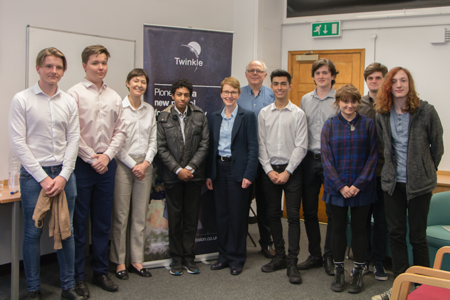We were very excited to welcome the UK’s first astronaut, Dr Helen Sharman, to UCL last week to present the Norman White Awards to ORBYTS students on behalf of the Spacelink Learning Foundation.
Initiated in 2016, the Original Research By Young Twinkle Students, or ORBYTS, programme has expanded into 5 teams with 45 students from 8 different schools across England. The two Norman White Awards, each of £500, are supporting the participation of groups at Highams Park School and Westminster School in the ORBYTS programme. Further groups are supported by Highgate School and its Chrysalis Partnership programme.
For this month’s Twinkle blog post, we would like to highlight the fantastic work done by our team of ORBYTS tutors and hear directly from two of them about their experiences.
Katy Chubb: Life as an ORBYTS tutor

Katy Chubb (3rd from right) at the presentation of the Norman White Awards to ORBYTS students by Helen Sharman. Credit: Twinkle Space Mission/B. Coates
We had an event recently where our groups of students were given the chance to present their work to a room of people, including the first Briton in space, Helen Sharman. I was quite overwhelmed by the enthusiasm and effort that they put into preparing and practising. A huge highlight of a project like this is the realisation that these students aren’t here because they have to, but because they choose to be. The start of a project can be a bit overwhelming for everyone, and as a tutor it can be difficult knowing where to start, but it gets easier and there are loads of small rewards along the way. Watching their progress over the weeks, and how they begin to become familiar with physics terms and concepts that are beyond their current curriculum is one. Another thing that I really enjoy about the project is when it gets to the stage when they begin helping each other; it takes the pressure off you as a tutor but also shows that they are learning. We have a couple of months break now for their AS-level exams before a few more weeks of meetings. I should feel relieved that I have more time to focus on my PhD work but I have a feeling I’m going to miss the ORBYTS sessions!
Katy Chubb is a Team Lead for the EduTwinkle ORBYTS programme. She has been a PhD student with the ExoMol group at UCL since September 2014.
Jack Baker: Highlights as ORBYTS Tutor

Jack Baker with Helen Sharman at the ORBYTS Meet an Astronaut event. Credit: Twinkle Space Mission/B. Coates
What I enjoy most about being an ORBYTS tutor is being able to bring important but often neglected aspects of physics and chemistry to the class room. Furthermore, students in the ORBYTS programme are often of the age where they are making important decisions in their lives with regards to University Admissions. I think that ORBYTS gives vital insider information on what it really like is to be a physics/chemistry undergraduate through the content and vision of the project – a chance most do not get at this crucial time.
A definite highlight for me was to see my group and groups from other schools present their work to an audience including astronaut Helen Sharman. It showcased how hard students had worked but also their new-found, genuine, interests in their Diatomic Molecule of choice. It was also a great chance to see the different approaches the other tutors had towards the project. I was then able to reflect upon my own methods and begin to implement good ideas from the other tutors.
Jack Baker is a PhD student at the London Centre for Nanotechnology, UCL, undertaking ground-breaking research in the field of Computational Condensed Matter Physics.